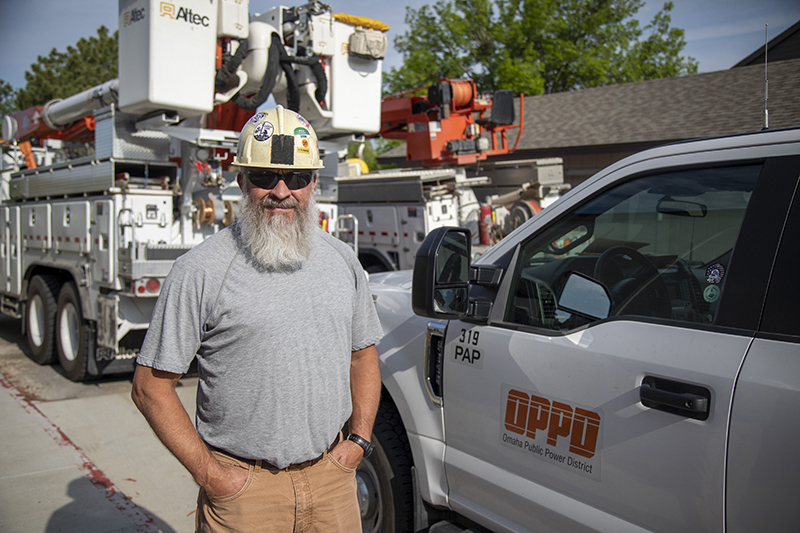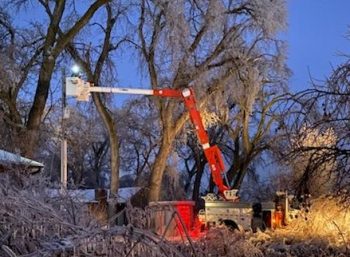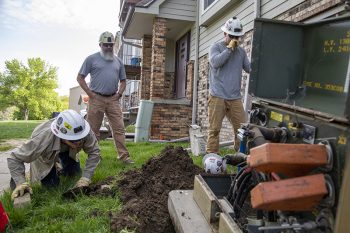Do you have what it takes to be an OPPD lineworker?

Editor’s note: This is the first story in a new series called “What It Takes.” The series explores the fascinating, fulfilling and sometimes surprising jobs available at OPPD, and what it takes to get hired for those jobs.
So you want to be a lineworker.
Get ready for a tough but fulfilling job – a lifestyle, really – where your family, friends and fellow citizens depend on you to keep the lights on. You’ll become part of a select, highly respected and tightknit community, in a career with a good salary, nice benefits and a lifetime of pride.
It’s also a big commitment, one that demands teamwork, precision, and a never-ending focus on safety. Becoming a full-fledged journeyman line technician usually takes six years and a genuine passion the work.
“It’s very rewarding,” said Tim Potts, manager at OPPD’s Transmission & Distribution Center in Omaha. Potts spent 17 years as a lineman. “If you like working with your hands, if you have some mechanical abilities, if you’re not scared of heights, it’s an amazing career.”
Line technicians are more important than ever in OPPD’s fast-growing service district, which has no shortage of work. More residents and businesses mean more infrastructure to build, more equipment to maintain and more issues to fix in the field.
“It’s definitely a challenge,” Potts said. “Not everybody can do it.”
The right education
It all starts with a community college program. Line school offers a simplified taste of the job: tying knots, climbing poles, electrical theory and how not to hurt yourself or damage equipment.
Many of OPPD’s line technicians are graduates of line technician programs at Metropolitan Community College in Omaha and Northeast Community College in Norfolk. OPPD is also building connections with schools in South Dakota, Iowa and elsewhere. Managers from the utility reach out to high schools as well, meeting with students as early as the 11th grade to gauge their interest.
OPPD recently started recruiting applicants with one-year degrees as well from certain line-schools. Line schools have traditionally offered two-year degrees, but some now provide accelerated one-year programs.
“Line school teaches you the basics of line work,” said Aaron Mercer, manager of OPPD’s Transmission & Distribution Center in Papillion and a former line technician. “It shows you whether you’re going to like this job.”
Making the cut
After line school, aspiring lineworkers apply for a job through OPPD’s selective apprentice boot camp, a hands-on, all-day test of line skills. Of the 30-40 applicants in a class, OPPD typically hires 10-15.

Potts, who ran the boot camp for years, said OPPD evaluators look for technical skills, an ability to work comfortably from high on a pole, and the ability to remain calm under pressure.
But that isn’t everything. OPPD wants team players, someone who will help a buddy who needs it and doesn’t quit when the job gets tough.
“We might hire the person with the best attitude,” Potts said. “We can have a rock star, but if they’re so cocky that you can’t stand to be around them, that doesn’t work very well.”
As you work from poles high in the air, instructors will holler and bark commands from the ground to simulate the kind of distractions you might encounter on a service call. They’ll run you through tasks designed to make you tired, exposing bad habits that could hurt you in the field.
“This job is very dangerous, and there a thousand distractions that can take your mind off of what you’re doing and make you complacent,” Mercer said. “We add that element of pressure to see if you can handle those distractions. This is a job where you have to pay attention from start to finish.”
Becoming an apprentice
If you make the cut, you’ll spend the next four years learning the craft from experienced journeymen and senior apprentices. Apprenticeships teach the real-world techniques you’ll use for the rest of your career.
“Once you’re hired and in the apprenticeship, stay humble and eager to learn,” Potts said.
Just like students, apprentices continue to study and take regular tests. A committee of seasoned line technicians, supervisors and managers tracks your grades and on-the-job hours. If you fail a test or aren’t performing well, the committee will work to help you, but it’s up to you to meet the standards.
“If you stay off track for a long period of time, if you fail a bunch of tests, we will ask you to leave the program,” Mercer said. “Your job is not guaranteed. If you want to become a line tech, you have to pass all of the obstacles we put in front of you.”
In the field
As an apprentice, you’ll sample many of the in-the-field jobs at OPPD to help you learn different facets of the business. You’ll shadow troubleshooters, street lighters and cable splicers. You’ll gain experience on both neighborhood distribution lines and higher-voltage transmission lines. Over the course of your apprenticeship, you’ll log a minimum of 8,000 hours on the job.
Don’t expect to do any “hot” work on live wires during your first six months. Plan on watching, learning, asking questions and helping whenever you’re needed. You will climb a lot, though, when lines are de-energized. As an apprentice, you’ll need to earn the trust and respect of your crew, whether it’s by cleaning tools to prepare for the next day or stocking a truck so it’s ready to go.
“For me, it’s being respectful, always keeping busy and being willing to work,” said Rickey Baxter, a field supervisor and former line crew leader. “And don’t be afraid to ask questions.”
Baxter said the job requires some sacrifices when things get busy. Families need to understand that, when a call comes on a holiday or in the middle of the night, you may need to report to work. Your job is essential, after all, and your community needs you.
By year two, expectations are higher. You’ll do some carefully controlled hot work under a journeyman’s direct supervision and continue helping your crew as needed.
“You should be at a point where you have everything set up, laid out, and ready to go, so when the journeyman needs it, you’re right there handing it to them,” Mercer said.
The big test
At the end of your apprenticeship comes the final exam: a two-day, exhaustive run-through of everything you’ve learned on the job and how you would apply that knowledge as a journeyman. After four years of hard work and study, most OPPD apprentices are ready. But don’t expect to sleep much the night before.
“You can be as prepared as you’re going to be, but you’ll still be very nervous,” Mercer said.
The first day features a written test that takes several hours, followed by a nerve-wracking wait for evaluators to grade it.
On the second day, apprentices sit before a committee that includes experienced line technicians, supervisors and managers. The committee questions you for hours, up to a full day, about proper line techniques, equipment, safety and situations you might encounter on the job.
“It’s a room full of people just staring at you,” Mercer said. “But once you start and your confidence sets in, it’s just like having a casual conversation.”
A journeyman’s life
Now you’re a journeyman. Congratulations! Get ready for many years of challenging, stimulating work on all kinds of projects. No day is the same.
Many veteran line technicians make the job look easy, but let’s be clear: The work is complex and technical. The hours can be long, in sometimes rotten weather, at all times of day, with customers eager to have their power restored. Safety is paramount.

Mike Jensen, a working line crew leader, has reported to plenty of late-night calls in his 26-year career. In every corner of the Omaha metro, his work has helped keep people warm, powered oxygen machines for the elderly, and cleared the way for new families and businesses.
That sense of service, pride and camaraderie with fellow line technicians make the challenges well worth it, he said.
“It’s a really good feeling to walk away from a job and have a happy customer,” Jensen said. “It’s very rewarding. Everything we do serves a specific purpose.”
It’s also a reminder of what’s at stake and the dedication required to succeed.
“Just because you’re tired doesn’t mean you can go sit in the shade,” Jensen said. “People need electricity, and they aren’t going to be happy if their air conditioning isn’t working and they see you lounging under a tree.”
Experience and opportunities
Experience brings more opportunities. You might become a crew leader, or a troubleshooter working solo, or maybe a supervisor overseeing several crews.
“You never stop, and you could be a week from retirement and probably still learn something brand new,” Mercer said. “And you’ll say to yourself, ‘Man, how did I not know that? I’ve been here 30 years.’”
You’ll also become a mentor for new apprentices, helping them just as others helped you. You’ll benefit from relationships built over the years, friendships made, confidantes who will help keep you safe. You might end up as the primary journeyman on a crew, using your experience to guide others. You’ll have opportunities to travel as well, whether it’s to provide mutual aid to another part of the country or show off your skills at a lineworker rodeo.
“There are certain things in this job that are going to challenge you, and you’ve got to navigate your way through it,” Mercer said. “You just can’t give up.”

Grant Schulte joined OPPD as a content generalist in 2022. He is a former reporter for The Associated Press, where he covered the Nebraska Legislature, state politics and other news for a global audience. He is a graduate of the University of Iowa and a proud Hawkeye. In his free time he enjoys running, reading, spending time with his wife, and all things aviation.
View all posts by Grant Schulte >


